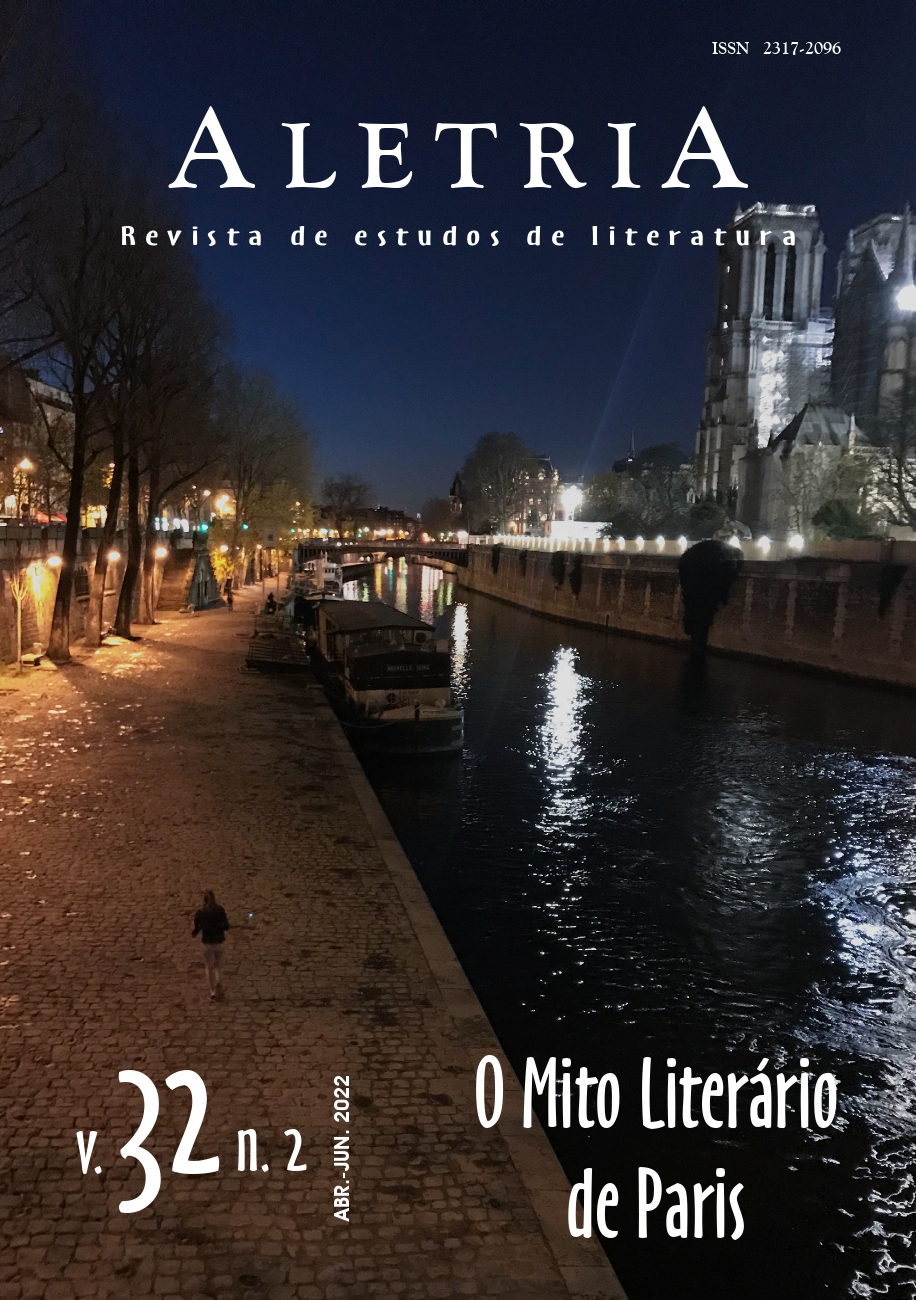The Neo-Slave Novel and Progressive Eugenics in Colson Whitehead’s The Underground Railroad
DOI:
https://doi.org/10.35699/2317-2096.2022.29105Keywords:
neo-slave novel, progressivism, eugenics, racism, historyAbstract
Colson Whitehead has been noted for writing books that migrate from one literary genre to another exhibiting then a penchant for genre eclecticism. In light of that, this study proposes that his book The Underground Railroad (2016) should be classified as a neo-slave novel due to its autonomy in recreating antebellum slavery. Besides, in so doing, Whitehead revisits specific shameful historical events represented by his country’s long use of racist medical procedures such as progressive eugenics. These events have been largely forgotten by most Americans and, thus, by recuperating such shameful past Whitehead indicates that progressive eugenics not only reproduced the same racist ideology under slavery but the writer also suggests the possibility that similar medical practices might still be in use today albeit with different names. In pursuing this analysis, the article turns to authors such as Bernard Bell (1987), Toni Morrison (1995), Ashraf H. A. Rushdy (1999), Valerie Smith (2007) as well as interviews with Whitehead.
References
ALLEN, Garland E. Is a New Eugenics Afoot? Science, v. 294, p. 59-62, 2001.
BALDWIN, J. The Creative Process. Library of Congress, 1998, p. 669-672.
BELL, B. The Afro-American Novel and Its Tradition. Amherst: University of Massachusetts Press, 1987.
BOUCHE, T. America’s Hidden History: the Eugenics Movement. Scitable by Nature Education: A Collaborative Learning Space for Science, 18 set. 2014. Disponível em: https://www.nature.com/scitable/forums/genetics-generation/america-s-hidden-history-the-eugenics-movement-123919444/. Acesso em: 16 jan. 2021.
BROWNLEE, D. Dear Progressives: Racism is Airborne and no One is Immune…not Even you. Forbes, 1 oct. 2020. Disponível em: https://www.forbes.com/sites/danabrownlee/2020/10/01/dear-progressives-racism-is-airborne-and-no-one-is-immunenot-even-you/?sh=1268007a24f4. Acesso em: 17 jan. 2021.
BUTLER, O. Kindred. Boston: Beacon, 1979.
COATES, T. The Water Dancer. New York: One World, 2019.
DISCHINGER, M. States of Possibility in Colson Whitehead’s The Underground Railroad. The Global South, v. 11, n. 1, p. 82-99, 2017.
FINOH, M. Allegations of forced sterilization in ICE detention evoke a long legacy of eugenics in the United States. Center for Constitutional Rights, 18 set. 2020. Disponível em: https://ccrjustice.org/home/blog/2020/09/18/allegations-forced-sterilization-ice-detention-evoke-long-legacy-eugenics.
GAINES, E. J. The Autobiography of Miss Jane Pittman. New York: Bantam Dell, 1971.
GILL, H. Conson Whitehead on “The Underground Railroad”. Scroll.in, 10 feb. 2019. Disponível em: https://scroll.in/article/912623/colson-whitehead-on-the-underground-railroad-theres-no-rule-about-what-i-can-write. Accessed 05 Jul 2020. Acesso em: 16 jan. 2021.
HOVENKAMP, H.J. The Progressives: Racism and Public Law. Arizona Law Review, v. 59, p. 947-1003, 2017.
LI, S. Genre Trouble and History’s Miseries in Colson Whitehead’s The Underground Railroad. Melus, v. 44, n. 2, p. 1-23, 2019.
MCCABE, L.; MCCABE, E. Are we Entering a “Perfect Storm” for a Resurgence of Eugenics? Science, Medicine, and their Social Context. In: LOMBARDO, P. (ed.). A Century of Eugenics in America: From the Indiana Experiment to the Human Genome era. Bloomington: Indiana University Press, 2011, p. 193-218.
MOORE, S. ICE is accused of sterilizing detainees. That echoes the U.S.’s long history of forced sterilization. The Washington Post, 25 set. 2020. Disponível em: https://www.washingtonpost.com/politics/2020/09/25/ice-is-accused-sterilizing-detainees-that-echoes-uss-long-history-forced-sterilization/.
MORRISON, T. The Site of Memory. In: WILLIAM, Z (ed). Inventing the Truth: The Art and Craft of Memoir. New York: Houghton Mufflin, 1995, p. 83-102.
MORRISON, T. Beloved. New York: Penguin Books, 1987.
NUGENT, W. Progressivism: A Very Short Introduction. Oxford: OUP, 2010.
REED, I. Flight to Canada. New York: Open Road Integrated Media, 1976.
REVERBY, S. M. Examining Tuskegee: The Infamous Syphilis Study and Its Legacy. North Carolina: The University of North Carolina Press, 2009.
RUSHDY, A. H. A. Neo-Slave Narratives: Studies in the Social Logic of a Literary Form. Oxford: OUP, 1999.
SHUKLA, N. Colson Whitehead: each book an antidote. Guernica, 24 apr. 2013. Disponível em: www.guernicamag.com/colson-whitehead-each-bookan-antidote/. Acesso em: 16 jan. 2021.
SMITH, V. Neo-Slave Narratives. In: FISCH, A. A. The Cambridge Companion to The
African American Slave Narrative. Cambridge: Cambridge University Press, 2007, p. 168-185.
WALKER, M. Jubilee. New York: Second Mariner Books, 1966.
WHITEHEAD, C. The Intuitionist. New York: Anchor Books, 1999.
WHITEHEAD, C. Sag Harbor. New York: Anchor Books, 2010.
WHITEHEAD, C. Zone One. New York: Anchor Books, 2011.
WHITEHEAD, C. The Underground Railroad. New York: Doubleday, 2016.
WHITEHEAD, C. The Nickel Boys. New York: Fleet, 2019.
Downloads
Published
Issue
Section
License
Copyright (c) 2022 Roberto Ferreira Junior (Autor)

This work is licensed under a Creative Commons Attribution 4.0 International License.
Authors who publish with this journal agree to the following terms:Authors retain copyright and grant the journal right of first publication with the work simultaneously licensed under a Creative Commons Attribution Non-Commercial No Derivatives License that allows others to share the work with an acknowledgement of the work's authorship and initial publication in this journal.Authors are able to enter into separate, additional contractual arrangements for the non-exclusive distribution of the journal's published version of the work (e.g., post it to an institutional repository or publish it in a book), with an acknowledgement of its initial publication in this journal.Authors are permitted and encouraged to post their work online (e.g., in institutional repositories or on their website) prior to and during the submission process, as it can lead to productive exchanges, as well as earlier and greater citation of published work (See The Effect of Open Access).





